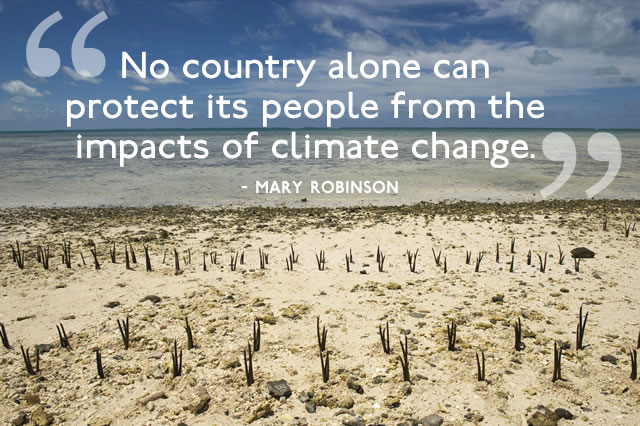2015 is the time for climate justice argued Mary Robinson at the Grantham Annual Lecture 2015
2015 is a year of global action. Governments will adopt a new set of Sustainable Development Goals, work together to draft a meaningful climate agreement, and craft a framework to provide the financial resources needed to deliver on a global sustainable development agenda. Mary Robinson cautioned the audience that they would be wise to remember that inclusive sustainable development can be realised only when all human rights – including gender equality – are protected, respected, and fulfilled, which is the climate justice way.
Referring to the latest climate science Mary Robinson said the Fifth Assessment Report of the IPCC makes it clear that world needs to reach zero carbon emissions by 2050 to maximise the chances of staying below 2°C. To do this, two thirds of the known fossil fuel reserves must be left in the ground and alternative sources of clean energy embraced.
But what challenges does this pose for people in developing countries? This was the core question explored by Mary Robinson in her lecture.
Acknowledging that the priority for developing countries is development, understanding that development needs energy and realising that energy does not have to mean fossil fuels, Mary Robinson set out her thoughts on how the world can stay below 2°C while protecting the right to development; the climate justice way.
“Zero carbon is compatible with, and essential to, achieving the right to development, with a shift to sustainable development, poverty eradication and a more equitable and inclusive model of development, especially if all countries are enabled to participate in the transition on the same time scale; and human rights and gender equality inform all climate and sustainable development actions.” argued Mary Robinson.
Mary Robinson emphasised the need for courage and leadership to change the current business model which is deeply rooted in fossil fuels and “has resulted in dangerous levels of pollution, caused climate change and biodiversity loss and has failed to eradicate poverty and inequality.”
Development will have to be addressed “using a different model to that which made the industrialised countries wealthy. This is a different prospect than merely reducing emissions and requires the absolute support of the international community. No country has developed without fossil fuels to date – so cooperation is key to providing the technology, finance, skills and systems to create an alternative way of developing.”
“It is in our collective self-interest to support a transition and this new model of development – as without it we will exceed the carbon budget and be forced to accept the consequences of a 4°C world. And that world will be far more unfair and unjust than the one we live in now. Business as usual has resulted in dangerous levels of pollution, caused climate change and biodiversity loss and has failed to eradicate poverty and inequality.”
A lively question and answer session saw climate finance, patent rights and short-term political agendas being discussed. In response to the final question which was on the Geneva Pledge, Mary Robinson returned to the principles of climate justice and the Universal Declaration on Human Rights which sets out the human rights framing for a new path to development in article 28:
“Everyone is entitled to a social and international order in which the rights and freedoms set forth in this Declaration can be fully realized.”
Mary Robinson concluded: “We haven’t yet created this social and international order – and any hope of creating it in the future would be wiped out by uncontrolled climate change. But I think we could create an international order where all people realise their rights if we grasp the opportunities 2015 presents the climate justice way”.
Related Links
Mary Robinson – Grantham Annual Lecture 2015
Imperial College London – Grantham Insitute
Zero Carbon, Zero Poverty – The Climte Justice Way
Our work on equity and climate justice
Read more about human rights and climate justice
Fifth assessment Report of the IPCC
Geneva Pledge on Human Rights and Climate Action announced
Grantham Annual Lecture in the Media (selected)
The Guardian: Mary Robinson developing nations must move rapidly beyond fossil fuels (17 April)
RTCC: Climate deals make 2015 ‘biggest year since 1945’, says UN envoy (17 April)


